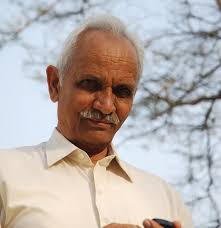By Mohit Dubey
Lucknow–For geologist Shiv Balak Misra it’s a moment of happiness wrapped with sadness. He’s happy that his 1967 discovery of a fossil in Canada has been recognised by Unesco, but sadly his name has not been mentioned. Simply put, the contribution of an Indian seems to have been ignored.
Misra had discovered the fossil at Mistaken Point, Newfoundland and Labrador in Canada. The place is now better known as Mistaken Point Ecological Reserve. Unesco has recognised it as a World Heritage Destination last week.

Sitting at his modest flat overlooking the sprawling Ambedkar Park, Misra recalls his days in Canada. He is happy that the world body has recognised the work, which he undertook many decades back as part of his thesis work that shed light on beginning of life on earth some 560 million years ago. But his name doesn’t find a mention.
He says it’s not about his name as such but the fact that an Indian’s contribution has been omitted. “It would have been a happier situation had the name been mentioned, as for generations to come a visit to the Reserve would have brought proud moments for Indians,” he muses.
Greetings meanwhile have poured in — from Uttar Pradesh Chief Minister Akhilesh Yadav and from hundreds of his admirers in the fraternity and people at large.
Recollecting the days he spent in Canada, Misra told IANS that when he chanced upon the fossils, the place was scantily populated and had only three families of workers at the Light House.
He had gone there to study “pre-Cambrian rocks”, and the fossil discovery was a bonus. This was first published in ‘Nature’ — a journal published from London.
Only after the discovery was published with photographs in an American journal in 1969 the world took note of it as a very serious and significant discovery.
In an honour to Misra for his discovery, the 565 million year old fossil was named in September 2007 after him: Fractofusus misrai
The site he points out was very crucial for educational purposes as it is a life record of the earth which is documented in the form of fossils which go on to tell that the life was not unicellular (as it was believed that time) but a document of larger life of multi-cellular life, Misra says.
“This site is also important because it provides a vital link to Darwin’s theory of evolution,” the septuagenarian says. He says that for ages the site would be of immense interest to biology students.
Misra now has a wish that an Indian’s name be duly recognised at the Mistaken Point. (IANS)













